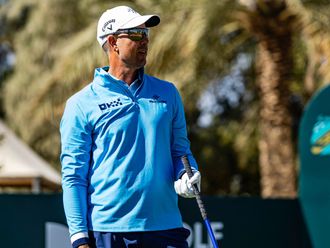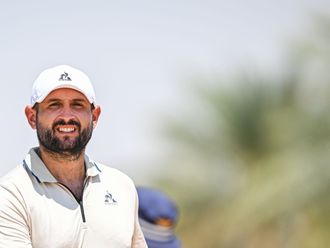For the two Palestinian swimmers travelling to the Beijing Olympics, simply being at the Games will be an achievement.
Hamza Abdu can sometimes train in a 25-metre pool but there are no Olympic standard (50-metre) pools in the Palestinian territories. Israeli travel restrictions prevent teammate Zakaya Nassar from training in Nazareth.
Abdu is looking forward to experiencing the Olympic spirit in August but knows the Games could be a chastening experience.
"We must represent ourselves in the same way that other countries do. I expect to do my best," Abdu, a diminutive 17-year-old, told Reuters.
Palestinians first flew their flag symbolically at the 1996 Games in Atlanta but there were no athletes. They had two representatives in Sydney in 2000 and three in Athens in 2004 and, despite modest performances, got a rapturous welcome.
None of the four current Palestinian team members have attained the minimum qualifying standard to compete in Beijing and they will participate under rules for fledgling nations.
Distance runner Nader Al Masri, the only representative from the Gaza Strip, and sprinter Ghadeer Ghroof from Jericho make up the four.
Showing promise
Abdu, from Jerusalem, has been swimming since he was 4 years old and has shown promise on the few occasions he has participated in competitions.
Coach Ebrahim Tawil said a lack of funding and the restrictions on travel made it impossible for athletes like Abdu to improve.
"There are many important events where our swimmers need to participate in order to improve but there is no money, so we cannot send them to competitions," Tawil said.
"We do get money to send swimmers to the Olympics but what can we achieve if there has been no proper preparation? What is the point?"
No official funding is forthcoming from the cash-strapped Palestinian Authority. Tawil said he was never certain if his charges would be able to get to events although a private donor might agree to fund flights.
"Our federation tries to cover the cost of taking the swimmers to train at 50-metre pools in west Jerusalem but this is not enough. They need to train in the morning and in the afternoon but this is too expensive," he said.
Effects of conflict
Tawil said the Israeli swimming association had tried to help but he believed that real progress for his swimmers could come only after the Israeli-Palestinian conflict was settled.
"The chairman of the Israeli swimming association is dying to help us and to cooperate with us but until there is a proper peace agreement between the sides it cannot be effective," said Tawil.
As a Jerusalem resident, Abdu has freedom of movement throughout Israel and can therefore train in Israeli Olympic-standard pools.
Nassar, his 19-year-old colleague, is less fortunate because she has no regular pool in which to train. Bethlehem-born Nassar, who will compete in the 50 metres freestyle, is a university student in the northern West Bank town of Jenin.
Jenin has no pools, according to Tawil. Even in Bethlehem, 150 km to the south, Nassar has only a tiny pool so proper training is impossible.
Tawil says Nassar's attempts to prepare for Beijing have been hampered by Israel, which has so far refused to allow her to travel to train in the major Arab-Israeli town of Nazareth.










